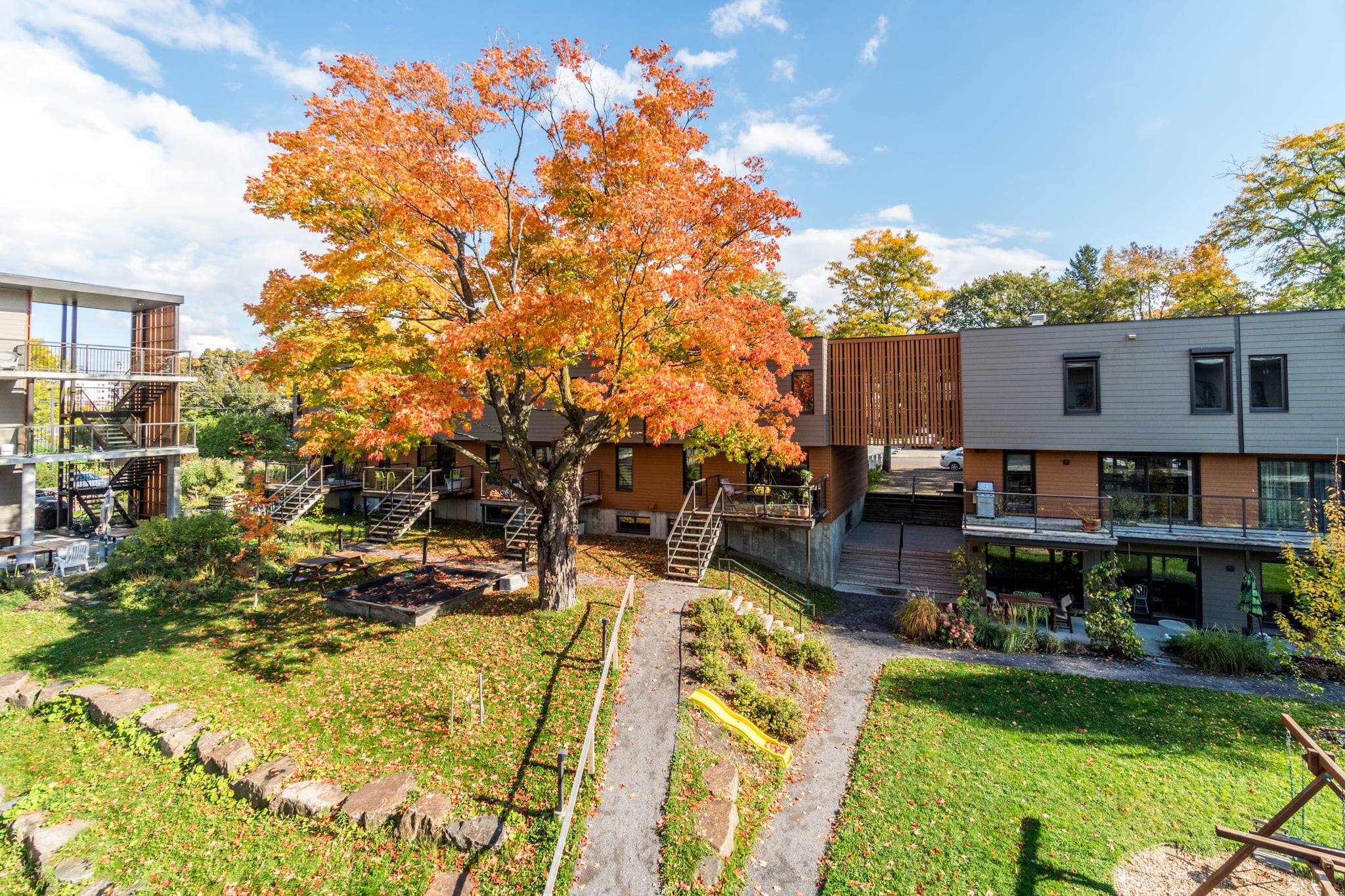Cohousing could be a remedy for the social isolation experienced by many—young and old—and could reduce the human footprint on the planet. But this type of community is still uncommon in Canada and can take many years to develop. The non-profit Village Urbain is currently developing a cohousing project destined for the greater Montréal area, and aims to “professionalize” this unique form of community.
“The [Urban Village] idea stems from the fact that we find that housing, as it is designed today, isn’t aligned with our way of life or the needs of society,” says Estelle Le Roux Joky, executive director and co-founder of Village Urbain. People often don’t know their own neighbourhood very well, she observes. Homes are getting smaller while costs are increasing, and society needs to find solutions to environmental issues such as urban sprawl.
Cohousing, a communitarian model born in Denmark in the 1960s, can address those issues. It is a collection of private homes built around communal spaces. “It’s more than housing, it’s a way of life,” Le Roux Joky adds.
Even though cohousing is based on sharing and community and residents are consulted on various aspects of the project, no one is obliged to participate in everything, all the time, and the personal life of the residents is respected.
“[In] cohousing, private housing is reduced to the bare minimum, to maximize common spaces and resources,” Le Roux Joky explains. In addition to private dwellings, there can be, for example, common play areas, a kitchen, office or workshop or spare rooms that can be reserved by residents to house guests. Resources that can be shared include tools, cars or whatever the community chooses.
In addition to strengthening the notion of community, sharing spaces shrinks the ecological footprint. “It reduces the average square footage per capita,” says Le Roux Joky. The sustainable development component is at the heart of the project envisioned by Village Urbain.
The Community Housing Transformation Centre granted $50,000 to allow Village Urbain to conduct a feasibility study for this affordable cohousing initiative.
“Professionalize” the model
The cohousing model is still uncommon in Canada. British Columbia leads the pack with more than two dozen, but only a handful of projects have broken ground in other provinces. According to the Canadian Cohousing Network, approximately 160 cohousing communities have been established in North America since 1991, and about 100 are currently under development.
One of the reasons these projects are few in number may have to do with the fact that the process of creating cohousing, often carried out by its hopeful residents, can be very long. Cohabitat Québec, a first—and a fine example—of its kind in the province, took 10 years before it housed the first residents of its 42 units in 2013. Though driven by motivated citizens, its journey was challenging.
That is why Village Urbain—which is still looking at suitable sites to set up its project—aims to “professionalize the construction of cohousing” to allow as many people as possible to live there. For Estelle Le Roux Joky, “building a real-estate project is not simple, a group of inexperienced citizens can’t simply set it up on its own. The result is that there is a really high failure rate.” Many citizen-led cohousing projects never materialize, she says. “People get discouraged because it takes time, it’s complicated, and it also takes a lot of money. ”
“One of the key issues in this kind of project is the attachment of future residents to their communities,” she adds. “[We want] to try to do as much as possible before engaging people, to free them as much as possible, but at the same time to involve them in key aspects. For example, with Sid Lee Architecture, we are setting up a kind of architectural co-design program.”
That’s why Village Urbain has partnered with an advisory committee made up of professionals working in community housing, architecture and real estate to support its efforts. Le Roux Joky herself has an MBA in Finance and worked in that field for many years. She left her job in Finance to co-create Village Urbain with Pascal Huynh and devote herself to it full time.
Jean-Pierre Racette, the founder and executive director of the Société d’habitation populaire de l’Est de Montréal (known as SHAPEM), is among those who support and advise Village Urbain. With over 30 years of experience in non-profit housing, with 1,900 units and $100 million in assets, he finds the project exciting but recognizes that “housing is incredibly complex,” involving construction, personal relationships, social dynamics, financing, government relations, tenant subsidies…. For Racette, it’s a given: “to manage [this] complexity, you need expertise.”
Starting a new project is therefore a huge challenge. But Racette believes in the potential of Village Urbain. “Estelle and I shared a common vision. The viewed the [housing] problem the same way…. [There are] strong affinities between our development models, [our idea] of building communities […]. For me, innovation is a must.”
Village Urbain wants to offer a mix of housing that will include owner-occupants and tenants. Some of the units will be reserved for affordable housing. “The idea is to be able to meet different needs,” says Le Roux Joky.
“[You need] a continuum where your housing stock is used to improve the condition of housing in a given territory,” Racette adds. “The biggest housing challenge we have is living together. Estelle’s project can address [that].”
The photo illustrating the article is a photo of Cohabitat Québec, the first cohousing community in Québec, opened in 2013. Credit: Cohabitat Québec



